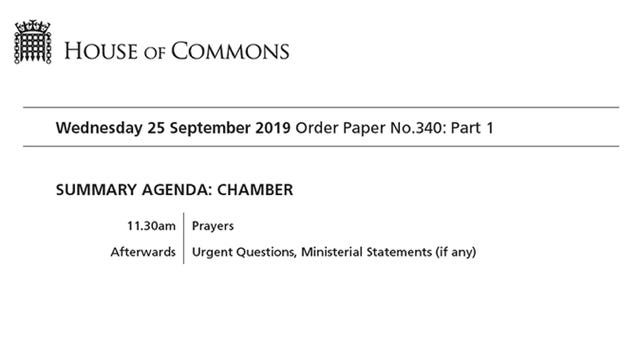Gove refuses to apologise for Johnson’s unlawful suspension of Parliament
MPs are returning to the Commons after the Supreme Court ruled against the Prime Minister.

Michael Gove has refused to apologise for the unlawful suspension of Parliament after the Supreme Court’s judgment left Boris Johnson humiliated.
The senior Cabinet minister acknowledged there had been “heated responses” to the ruling although he said he did not recognise reports that Commons Leader Jacob Rees-Mogg branded the court’s actions a “constitutional coup”.
The Commons will resume sitting on Wednesday after the bombshell legal ruling by the 11 Supreme Court justices.
Mr Johnson, who cut short his trip to the United Nations in New York, will make a statement to MPs on Wednesday afternoon, according to the Labour whips office.
His RAF flight arrived in London a little over an hour before the scheduled reopening of the Commons.
The Prime Minister faced demands for his resignation from furious opposition parties determined to hold him to account over his Brexit plans.
Downing Street insisted there was no question of him standing aside, despite the Supreme Court ruling there was no “reasonable justification” for his advice to the Queen to prorogue Parliament for five weeks.
The row dragged the Queen into Westminster’s bitter Brexit battle, but Mr Gove would not apologise for the Government’s actions.
The Chancellor of the Duchy of Lancaster told the BBC: “I don’t think that the Government should apologise for having a strong domestic agenda, I don’t think we should apologise also for seeking to advance our exit from the European Union.

“I don’t think the Government should apologise also for saying that we are attempting to honour the democratic will of the British people.”
Asked about Mr Rees-Mogg’s comments, reportedly made during a Cabinet conference call in response to the crisis, Mr Gove told Sky News: “There have been some heated responses from various people but I think the appropriate thing is to pause and reflect on this judgment but also to recognise it is vitally important now Parliament is reconvening to get on with the job of delivering Brexit.”
He said the position shared by all ministers is that “we respectfully disagree with the reasoning behind this judgment”.
Asked about newspaper reports regarding Mr Rees-Mogg’s comments, he replied: “I don’t recognise that language at all.”
Justice Secretary Robert Buckland defended the independence of “our world-class judiciary”.
He added: “Personal attacks on judges from any quarter are completely unacceptable.”
The Prime Minister cut short his trip to the United Nations in New York to return to London following the court’s judgment.
In his speech to the UN General Assembly his only mention of Brexit was a comparison to the myth of Prometheus.
Referring to how the Titan’s liver was pecked out by an eagle, he said: “And this went on forever.
“A bit like the experience of Brexit in the UK, if some of our parliamentarians had their way.”
Mr Johnson is expected to land in the UK at around midday and could face the Commons in the afternoon.
The Prime Minister spoke to the Queen after the Supreme Court verdict but Government sources would not comment on whether he apologised.
Despite calls for Mr Johnson to quit, opposition leaders appear split over how to proceed and there appears little prospect of an imminent motion of no confidence to oust him.
They are reluctant to act until an extension has been secured to the Brexit deadline because of suspicions that Mr Johnson may refuse to comply with the provisions set out in the Benn Act which required the Prime Minister to delay Brexit unless Parliament has either approved a deal or agreed to leave the EU without one.
There is also no clear consensus on who could lead an interim administration if Mr Johnson was deposed – with the Liberal Democrats refusing to support Jeremy Corbyn’s claim to Number 10 if the Tory leader is ousted.
Mr Corbyn told BBC Radio 4’s Today programme: “Until it is very clear that the application will be made, per the legislation, to the EU to extend our membership to at least January, then we will continue pushing for that and that is our priority.
“When that has been achieved we will then be ready with a motion of no confidence.”





